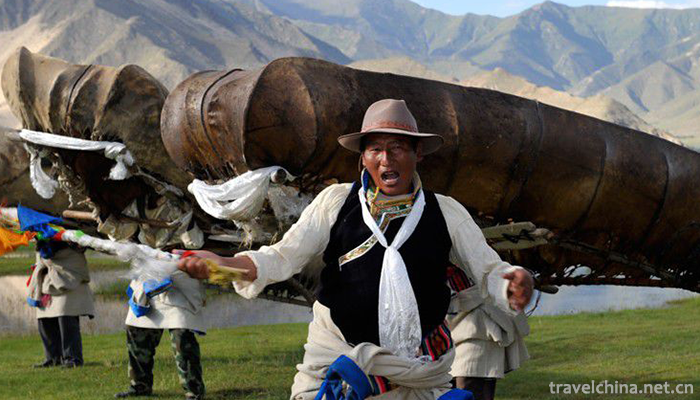Kuozi Guzi
Guzi, also known as "Guzi Dance" and "Cowskin Boat Dance", is a unique folk dance of two groups of Junba in Chabalang Village, Qushui County, Tibet Autonomous Region. In 2008, Junba Fishing Village was listed as the national intangible cultural heritage. Dance by singing while dancing "Ah Ge" and the boatman who backed the cowhide boat and hit the boat sounded for rhythm dance performance. The whole dance is vigorous, rough and simple.
Forms of expression
The whole dance of Guzi is vigorous, rough and simple. Guzi performed in cooperation with boatmen who sang and danced alongside the "Ah Ge" and the cowhide boat on their backs and hit the boat to make sounds for rhythmic dancing. "A Ge" is the leader of Guozi dance. When dancing a cow-skin boat, "Ah Ge" sings and dances with the "Tower" (colorful flagpole). Several other dancers (usually 4-6 people) watch the "Ah Ge" movement, carrying about thirty or forty kilograms of cow-skin boat on their backs, and follow the "Ah Ge" dance with the same movement. Everyone's movements are neat, and the sound of pulp hitting the ship's side is endless, light and dignified. Guozi dance is a kind of self-entertainment and self-enjoyment of Junba people after monotonous and heavy work. Often after fishing, several people gather together, carrying a cow-skin boat, singing and dancing, the hardship of life in singing and dancing becomes relaxed and happy.
historical origin
Guzi originated from "Zhongzi" (Yak Dance). Many movements of dancing Guzi have the characteristics of "plateau boat" - yak.
Junba village is the only village in Lhasa which mainly produces fisheries. "Junba" means "catcher" or "fisherman" in Tibetan. Geographically, Junba village is located in the lowest reaches of the Lhasa River, surrounded by mountains on three sides and facing water on one side. Historically, Junba village has been blocked by traffic and scarce arable land. Fishing was once their only way of survival. Junba villagers who make a living by fishing have created a unique fishing culture in the long-term labor process.
The small calfskin boat is not only a fishing tool for Junba villagers, but also a prop for dancing after they work.
In the past, Junba fishermen had to take long-distance water freight service to the old local government every year, mainly to transport tea, salt, cattle and wool, groceries and so on. From Mozhugongka County in eastern Lhasa to Lhasa or Shannan, cattle tankers can be seen on a total of 230 kilometers of waterway. The Kraft can only drift upstream to downstream, not upstream. When they reached their destination, the boatmen dried the tanker, carried it on their shoulders and carried it back to their place of departure.
Over the years, drifting on the river, singing kayak songs and dancing kayak dances have gradually become a unique form of entertainment for boatmen.
primary coverage
Dance
In fact, the complete Guzi is divided into four sections. The first paragraph is called "narrative". A dancer named "A Ge" said the opening line: "Shenniu patronizes Junba village, eats grass on the East mountain, drinks spring at the foot of the West mountain, rolls and plays on the pasture, and practices gladiatorial fighting in the bullpen."
The second paragraph is called "Zhongzi" (yak dance). The boatmen were first in "miscellaneous! Za ang! Za ang! " At the same time, "Ah Ge" sings "Blessing Song" while dancing.
The third paragraph is called "Chaohada". "Ah Ge" sings "Blessing Song" and takes Hada out of his Tibetan robe and puts it on the sand while jumping. The kayak dancers bend forward while jumping, and lift Hada from the ground with the left and right upper corners of the kayak on their backs.
The fourth paragraph is to sing "Blessing Song". The main idea of the lyrics is: "Today we meet here, I hope we can meet regularly. I wish you all good health, people you often meet. After singing, Ah Ge took the lead in saluting the audience.
Boat song
There are two kinds of boat songs: one is long and soothing, such as the river is passing away, such as the clouds are long, with a strong Lyric color, this kind of song is sung by the boat as it drifts across the vast river; the other is the trumpet, which is from the boatmen's heart when they fight with the wind and waves, short and warm. Some are just wordless songs, ups and downs, in tune with the waves, or even integrated.
Skill inheritance
According to a 2010 survey, only the elderly Zasang in Junba fishing village is the only "Ah Ge" in the village. He hopes to teach some young people to perform "Ah Ge", but the young people in the village, including his three children, are not interested in the cowhide boat dance. With the death of the old people in the village, the production skills and inheritance of the kayak dance are facing a crisis.

0 Questions
Ask a Question
Your email address will not be published.